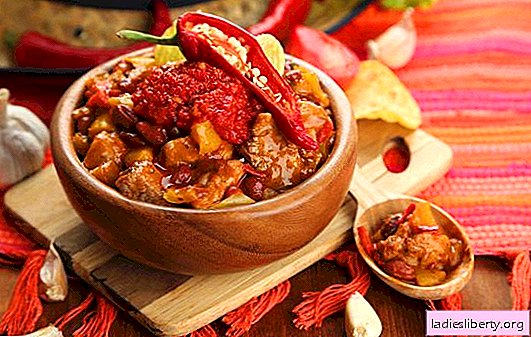
According to a recent study, people who prefer spicy foods live 2-4 years longer. Americans who regularly season food with pepper are much less likely to suffer from civilizational diseases.
How does spicy food prolong life?
Medical students from the University of Vermont evaluated the data from the National Health and Nutrition Survey (NHANES). The NHANES regularly reviews various aspects of US nutrition and lifestyle. One issue was the preference for red chili peppers. Spice gives the food a "sharp note" due to the high content of capsaicin.
Of the 16,179 adult Americans interviewed between 1988 and 1994, 4,946 people have since died. Among Americans who like to season chili foods, the mortality rate was only 21.6% compared to 33.6%. This is a wonderful difference, but primarily due to the fact that young people use spices more often.
Chile lovers were white men - Mexicans. They more often got married, smoked more cigarettes or drank more alcohol, and also consumed a lot of vegetables and meat. They had low “good” cholesterol, low income and less education. All of these factors affect the risk of death in one direction or another.
The listed effects can be eliminated mathematically. However, an adjusted risk ratio of 0.87 remained below the line, which was statistically significant with a 95 percent confidence interval. This means that the risk of death among chili consumers may be reduced by 13%.
Causation cannot be deduced from an epidemiological study. The simplest objection is reverse causality. It may happen that people with an increased risk of illness first lose their appetite, so they refrain from overly spicy spices.
However, this is not the first study to come to this conclusion.
Two years ago, Chinese epidemiologists reported that drinking chili reduces the risk of death.
In Chinese, who ate spicy food 3 to 5 times a week, the risk of death decreased by 14%.
At that time, scientists suggested that the antimicrobial, antioxidant, anti-inflammatory and anti-cancer properties of capsaicin are responsible for the effect. Chinese scientists have put forward a hypothesis about the mechanism of action of chili. The TRP channels through which capsaicin develops its acute action should also be involved in the regulation of longevity.
What is the benefit of chili?
Red pepper contains a large amount of vitamin C and carotene. Chile is a good source of most B vitamins. A high vitamin C content can also significantly increase the absorption of non-heme iron from the intestines.
In recent years, chili peppers have become a popular subject of medical research. It has a beneficial effect on the intestinal flora and reduces body weight. In general, this can lead to lower mortality rates.
Another feature of capsaicin, which is found in most varieties of chili, is analgesia. Research conducted in 2007 highlighted the QX-314 molecule, which has the ability to cross the cell wall of a neuron and reduce pain. Chile is able to completely suppress any sensations without affecting the functioning of other nerve cells.
For this reason, it can be used as an anesthetic, which causes few side effects.
Some use red pepper to treat conditions with chronic pain.
Chile also promotes good digestion, as it increases the production of saliva and gastric juice. It is recommended to use red pepper in moderate doses - not more than 5-10 dried or fresh pieces. Excessive consumption of chili causes abdominal pain, diarrhea, dizziness, and headache.
Moderate doses of chili prolong life by 2-4 years, according to recent studies. However, excessive use of red pepper has not been studied in scientific papers. Therefore, caution is advised, and if vague symptoms appear, seek medical advice.











